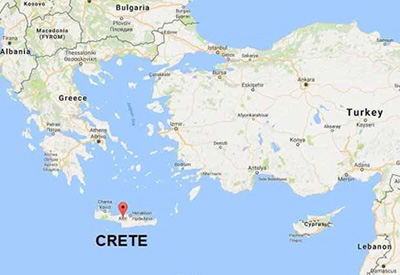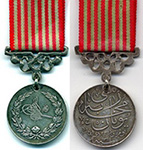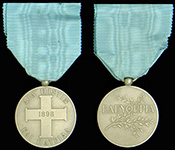Greco-Turkish War (1897)
The Greco-Turkish War of 1897 pitted the forces of the Ottoman Empire against the unprepared Greek military. At issue was the Ottoman Province of Crete, whose majority Greek population desired union with Greece.

Greece was completely overwhelmed in the brief (32-day war). There was a noticeable absence planning, fortifications, and modern weapons. The Ottoman forces, composed primarily of Albanians, on the other hand, under the tutelage of a German Military Mission, were far better prepared and equipped.
On March 24, 1897, a force of 2,600 Greek irregulars crossed the border into Ottoman Macedonia. War was officially declared on April 18, 1897. The Greek strategy of open field combat proved disastrous. It left the Ottoman forces virtually unopposed and prepared to enter Athens. The intervention of Tsar Nicholas II of Russia resulted in the Ottomans halting their attack. A ceasefire was declared on May 20, 1897.
A peace treaty signed on September 20, 1897 resulted in Greek cessation of some border areas and payment of reparations.
In spite of the military outcome, the protests on Crete (Cretan Revolt) continued until November 1898. At that point, the Great Powers evicted the Ottoman forces and created an autonomous Cretan State under the suzerainty of the Ottoman Empire. Prince George of Greece and Denmark assumed the role as High Commissioner. Greece formally annexed Crete in 1913.
The Ottoman Empire issued a 25mm, silver commemorative medal for the war against Greece. The obverse contains the cipher of Sultan Abdul Hamid II framed by a laurel wreath and rose at the knot. The reverse (based on the Rumi calendar) reads GREEK WAR DAY-SUNDAY 23RD OF ZILDAKE1314.


Ottoman Medal for the 1897 War and Greek Cretan Revolution Medal
The most likely unofficial Cretan Revolution Medal represents the period of unrest immediately following the Greco-Turkish War of 1897 and what has been described as a successful revolution in a long history of revolutions. Translated, the obverse has the words FOR FAITH AND COUNTRY set around a cross bearing the date 1898. The reverse is inscribed FREEDOM. No details were given as to who would have received the medal and there seems to be some doubt as to whether or not it was officially recognized by either the Greek or Cretan Governments.
The Greco-Turkish War of 1897 pitted the forces of the Ottoman Empire against the unprepared Greek military. At issue was the Ottoman Province of Crete, whose majority Greek population desired union with Greece.

Greece was completely overwhelmed in the brief (32-day war). There was a noticeable absence planning, fortifications, and modern weapons. The Ottoman forces, composed primarily of Albanians, on the other hand, under the tutelage of a German Military Mission, were far better prepared and equipped.
On March 24, 1897, a force of 2,600 Greek irregulars crossed the border into Ottoman Macedonia. War was officially declared on April 18, 1897. The Greek strategy of open field combat proved disastrous. It left the Ottoman forces virtually unopposed and prepared to enter Athens. The intervention of Tsar Nicholas II of Russia resulted in the Ottomans halting their attack. A ceasefire was declared on May 20, 1897.
A peace treaty signed on September 20, 1897 resulted in Greek cessation of some border areas and payment of reparations.
In spite of the military outcome, the protests on Crete (Cretan Revolt) continued until November 1898. At that point, the Great Powers evicted the Ottoman forces and created an autonomous Cretan State under the suzerainty of the Ottoman Empire. Prince George of Greece and Denmark assumed the role as High Commissioner. Greece formally annexed Crete in 1913.
The Ottoman Empire issued a 25mm, silver commemorative medal for the war against Greece. The obverse contains the cipher of Sultan Abdul Hamid II framed by a laurel wreath and rose at the knot. The reverse (based on the Rumi calendar) reads GREEK WAR DAY-SUNDAY 23RD OF ZILDAKE1314.


Ottoman Medal for the 1897 War and Greek Cretan Revolution Medal
The most likely unofficial Cretan Revolution Medal represents the period of unrest immediately following the Greco-Turkish War of 1897 and what has been described as a successful revolution in a long history of revolutions. Translated, the obverse has the words FOR FAITH AND COUNTRY set around a cross bearing the date 1898. The reverse is inscribed FREEDOM. No details were given as to who would have received the medal and there seems to be some doubt as to whether or not it was officially recognized by either the Greek or Cretan Governments.
Website Maintained by Keith Emroll